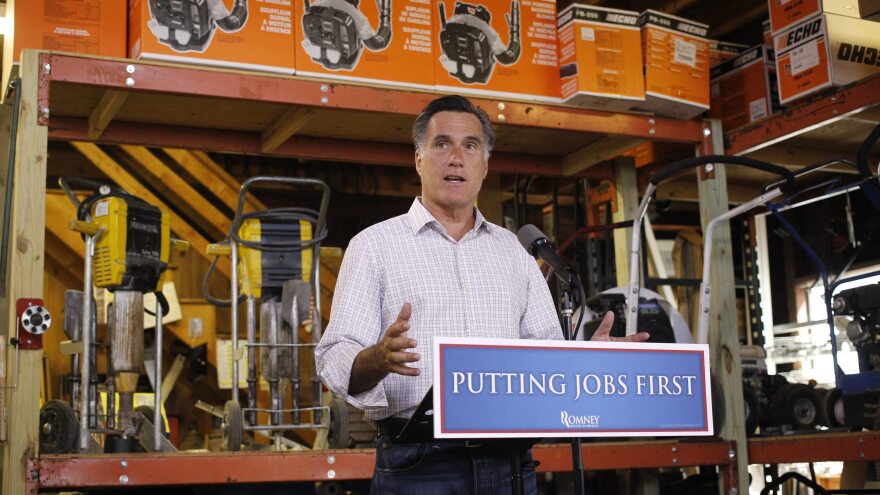Republican presidential candidate Mitt Romney says he can do better than President Obama at finding jobs for unemployed Americans. One way he would do that is by bringing back personal re-employment accounts.
When people lose their jobs, one of the first places they turn to is their state unemployment office, where they can sign up for unemployment benefits; they often can enroll in some kind of retraining class as well.
If people are unemployed because their skills are outmoded ... then they need new skills. That can't be done on the cheap.
In 2004, the Bush administration conducted an experiment to begin privatizing a small part of the federal retraining program.
"The justification was that you would better manage yourself than if people in the public sector were giving you guidance about training and re-employment services," says Stephen Wandner, a former senior economist at the Labor Department.
The program worked by giving unemployed workers an account containing $3,000 to get back on their feet. They could use the money to pay for job training, or just to help them in the job search. For instance, it could pay for travel to job interviews or for printing resumes.
"It was entirely theirs," says John McAllister, chief deputy director of the Labor Department in Idaho. "There [were] no restrictions on it whatsoever."
Idaho is one of the states that participated in the program. McAllister says if people got jobs right away, they were free to take the money as a bonus and spend it how they wanted. McAllister says he thought the prospect of getting a bonus would encourage people to look for work more aggressively. Instead, he says, they mostly used the money for what are called supportive services.
People used the money to pay for things that made it possible for them to hold down jobs. It went to pay for day care or new work clothes or car repairs. McAllister says people didn't really need encouragement to look for work.
"I think we misjudged the population we were dealing with," he says. "They had difficulty even getting to a job. They had to solve that before they could get the bonus. We got the cart before the horse, is one way to put it."
The program was never extended after it ended. An independent report issued a few years later concluded the program wasn't a big success. Now, Romney has talked about reviving the program if he's elected, though he hasn't provided many details about what he would do differently.
The Romney campaign didn't respond to requests for comment.
Ross Eisenbrey of the Economic Policy Institute says if personal re-employment accounts are to work, the government has to be realistic about the cost. He says $3,000 simply isn't enough to retrain most laid-off workers.
"If people are unemployed because their skills are outmoded and they're not going to find the kind of skills they've done in the past, then they need new skills," Eisenbrey says. "That can't be done on the cheap."
Wandner, who is now with the Urban Institute, agrees. He says it's hard to get many unemployed people interested in job retraining programs. He says most unemployed people simply want to find work as soon as possible, and it's probably more cost-effective for the government to assist them by pointing out existing job openings or teaching them how to write a resume.
"If you give an individual job search assistance and he goes back to work, you pay out less unemployment insurance," Wandner says. "And the government receives more taxes such that job search assistance actually pays for itself."
Even with government help, finding work may not be easy, especially at a time like this. Many people will have to reinvent themselves, and the challenge is finding a way to help them do that and get them back to work as soon as possible.
Copyright 2020 NPR. To see more, visit https://www.npr.org.



